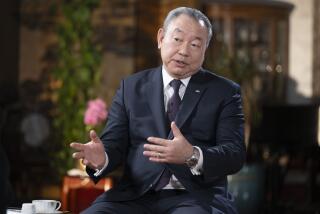Opposition Candidate Picks Middle Ground
- Share via
TAIPEI, Taiwan — President Chen Shui-bian is taking Taiwan down a dangerous and irresponsible path in his bid for reelection, opposition candidate Lien Chan said in an interview.
“He’s trying to do something to antagonize the mainland,” Lien said Thursday, referring to Chen’s decision to call a referendum on China’s missile program.
“If that brings a furious reaction, intimidation, even a missile crisis, all this will serve his purpose” of diverting attention from Taiwan’s economic and social problems, he said.
Lien said if he was elected March 20, he would begin a dialogue with China “as soon as the atmosphere is right.”
He said he would aim to establish direct sea links within a year, direct air links within two years and, eventually, a cross-strait free trade pact, common market and peace agreement.
Lien, who declared his candidacy Wednesday, as did Chen, trod carefully around the issue of Taiwanese sovereignty, staking out a position somewhere between Chen’s and Beijing’s.
While Chen has made political distance from Beijing a cornerstone of his reelection strategy, Lien said he believed that it was too early to end the ambiguity surrounding Taiwanese sovereignty, given the risk of inflaming regional tensions. “We believe no one can push history,” Lien said.
Beijing, which considers the island part of China, has made no secret of its displeasure with Chen, his policies and his decision to call a referendum, a move the mainland sees as a veiled step toward independence.
Lien defended the status quo on Taiwan -- an arrangement carefully cobbled together over the past half a century of cross-strait relations -- even as he cited the need to spend more on weapons systems.
“We don’t want to add another crisis to the already full agenda of the U.S.,” he said. “And we look forward to a resumption of relations with China in the future. But we also must negotiate from a position of strength, not weakness. We must have a credible defense capability.”
Taiwan should be allowed to join “functional” international bodies like the World Health Organization and the World Bank, Lien added, although he made no appeals for full U.N. membership during his interview.
Beijing’s insistence that Taiwan reaffirm its commitment to a one-China policy before talks is a nonstarter, he added, unless the mainland is willing to accept a unified China based in Taipei. He also rejected a one-country, two-systems approach for Taiwan, similar to the one Beijing has implemented in Hong Kong.
Some political analysts say the election will be Lien’s to lose. Taiwan’s economy has been lackluster during Chen’s four-year term, and cross-strait relations have deteriorated, even as the island has found itself increasingly isolated globally as a result of Beijing’s diplomatic charm offensive and surging economic strength.
Even though Chen’s push for a referendum has diverted attention from his record, he has managed to cut Lien’s strong early lead to create a close race.
Lien also has been dragged by public opinion into following or supporting many of Chen’s initiatives after initially opposing them, including the president’s calls for constitutional reform, a newly enacted referendum mechanism, the end of a one-China policy and calls for Beijing to remove missiles it has positioned on its coast opposite Taiwan.
Chen has been more adept at responding to the new mood of the island’s electorate, increasingly proud and unapologetic about having a Taiwan identity, some analysts say.
“Chen recognizes the significance of the public’s shifting mood,” said Chin Heng-wei, editor of Contemporary Monthly, a social issues magazine. “The Taiwanese are really awake now.”
Other analysts say Lien may find it difficult to deliver quickly on his initiative for improved cross-strait relations if elected, given the public distrust from his party’s having cozied up to Beijing in the past.
Lien, who acknowledged that Chen was a good campaigner, noted that any incumbent president would have a big advantage in setting the political agenda. Lien said he was still ahead of Chen in many polls and expected to prevail March 20.
“The momentum is still there,” Lien said.
More to Read
Sign up for Essential California
The most important California stories and recommendations in your inbox every morning.
You may occasionally receive promotional content from the Los Angeles Times.










